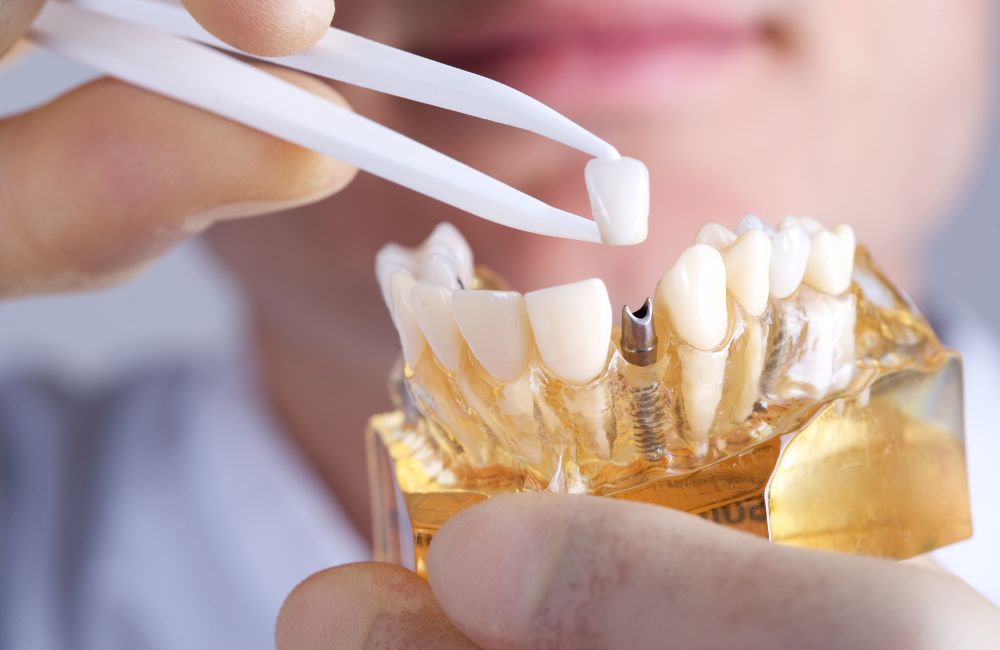Do you have gaps in your smile that have affected your self-esteem or made it difficult to eat certain foods? Well, you are not alone.
Millions of people worldwide experience tooth loss, and the impact goes beyond just aesthetic concerns. Fortunately, all-on-four dental implants are revolutionizing the way we treat tooth loss.
In this little guide, we’ll explore the benefits of all-on-four dental implants and why they could be the perfect solution for you.

Contents
What are all-on-four dental implants?
All-on-four implants, also known as full-arch dental implants, combine the benefits of dental implants and dentures. They are a permanent solution for individuals missing most or all their teeth.
Instead of traditional implants that require one implant per tooth, all-on-four implants use four implants to support an entire arch of prosthetic teeth.
This design means the implants can be strategically placed, even where the jawbone is thin. The unique angle of the implants allows for maximum support with minimally invasive procedures, making it ideal for individuals who want to avoid bone grafting. The restorations look and function like natural teeth, improving speech, biting force, and aesthetics.
Benefits of All on Four Dental Implants
Great Benefits of All on Four Implants: If you have multiple missing teeth, considering dental implants could be the ideal way to replace them. All-on-Four implants may provide the perfect solution, as they can replace an entire arch with just four implant posts inserted into your jawbone.
These dental implants can also be more affordable than traditional alternatives like bridges and dentures due to fewer procedures and follow-up appointments for aftercare.
These dental implants are permanent and with proper care, can last decades. Furthermore, they help improve oral health by preventing bone loss and tooth decay.
Dental Implants Are Considered as a Permanent Solution
Dental implants offer long-term solutions to tooth loss that offer multiple advantages. Implants can help avoid bone deterioration, gum disease, and other potential issues associated with missing teeth that might arise as a result.
Dental bridges can help preserve the health of adjacent teeth while reducing bone degradation and resorption, which could otherwise lead to jawbone loss.
All-on-four dental implants are an affordable, conservative solution that can dramatically enhance both quality of life and self-esteem, but they do come with risks such as bleeding, infection, nerve damage, or sinus issues – it is, therefore, vital that before making your decision to get implants you carefully consider these potential advantages and drawbacks before making a final decision.
Dental Implants are considered a permanent solution and offer many benefits, including improved appearance and a stable, comfortable fit that can last a lifetime.
Dental Implants Can Help Prevent Bone Loss
They help preserve the alveolar ridge of the jaw by preventing bone resorption. Resorption occurs when the bone breaks down too quickly before the body can absorb it.
Bone loss can be a problem for many individuals. It may result in improperly fitting bites, changes to facial structure, and even joint problems in the jaw joint area.
Furthermore, this may lead to an increased risk of oral cancer.
As part of their implant surgery planning process, your dentist will collect 3D images and models of your mouth to assess if its density and surface area can support dental implants over the long term.
If your X-rays indicate insufficient bone density, bone grafting may be required as a remedy. Bone grafts add new bone material into an area and serve as scaffolding for potential dental implant placements.
Dental Implants Can Help Prevent Periodontal Disease
If gum disease has left you toothless, dental implants provide a permanent solution that looks and functions just like natural teeth. Unlike dentures which require adhesives to secure them in place, implants are permanently secured within your jaw bone so as to not shift or tilt over time.
Ideal candidates for dental implants require gums free from periodontal disease and healthy enough for healing before implant placement. This is essential as the implants must heal first before placement can take place.
Gum disease destroys gum tissue and allows bacteria to infiltrate deeply into the bone that holds your teeth, ultimately leading to tooth loss if left untreated.
Patients suffering from gum disease may still qualify for dental implants, provided their periodontal health is in good shape before beginning. A bone graft may also be required to ensure enough density and mass in their jawbone to support an implant.
Dental Implants Can Help Prevent Gingivitis
The success of dental implants depends on two key elements: your jawbone’s ability to fuse with the implant body and healthy gum tissue. Patients who lack both are more prone to post-surgery complications like peri-implantitis.
Dental implants should be treated the same as natural teeth in order to maintain good oral health and avoid gum disease, including brushing and flossing daily and visiting their dentist every six months for checkups and cleanings.
Most people can qualify for dental implants thanks to diagnostics and bone reconstruction advances. At your initial consultation appointment, your dentist will thoroughly evaluate your mouth before taking x-rays of your jaw and conducting other necessary examinations. The Ontario Dental Association also recommends that patients have a thorough dental exam and cleaning before receiving implants.
Bottom line
Overall, all-on-four dental implants are a unique way to replace missing teeth successfully. They offer multiple advantages over traditional implant treatments, which can be more invasive, costlier, and require longer recovery times. If you want to improve your oral health and smile, all-on-four implants could be the perfect solution.